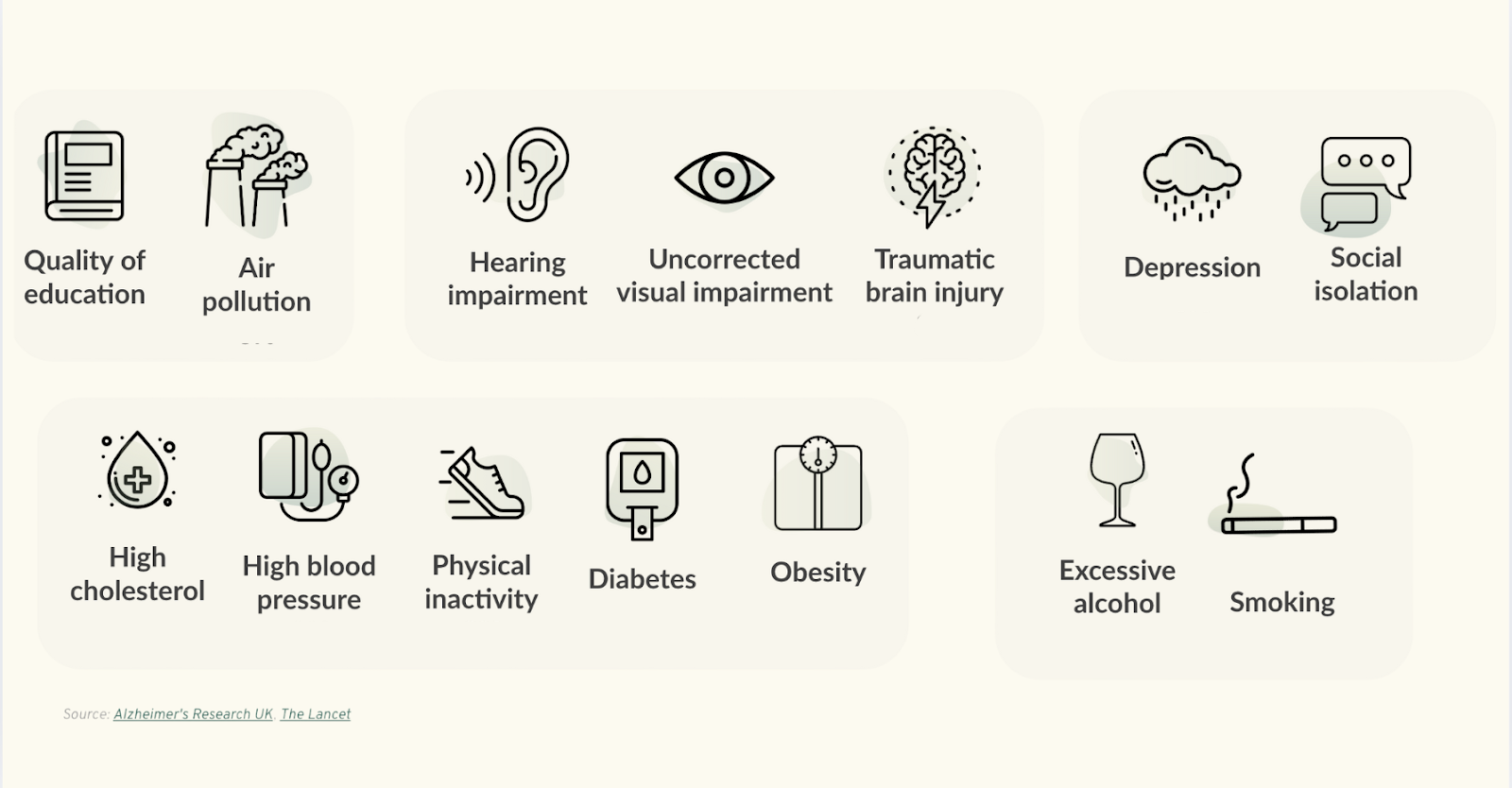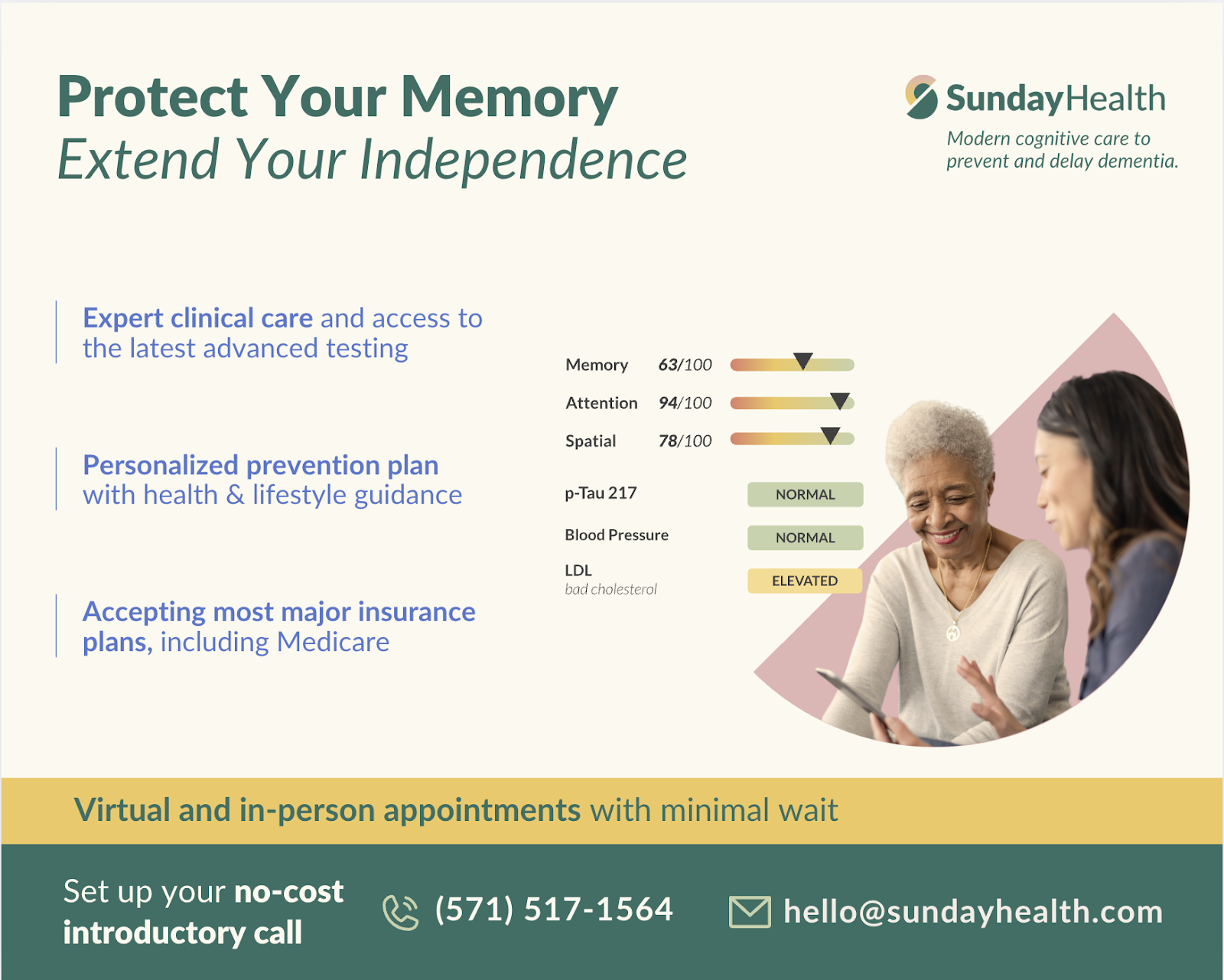Debunking Common Myths: "There's Nothing I Can Do to Prevent Dementia"

Debunking Common Myths: "There's Nothing I Can Do to Prevent Dementia"
Misconceptions about cognitive health – our memory and thinking abilities – and aging are widespread and often prevent people from seeking the care they need. In this four-part series, the brain health experts at Sunday Health will debunk common myths that might be standing between you and optimal cognitive wellness.
One of the most harmful misconceptions about dementia is the belief that individuals have no power to reduce their risk or prevent its onset. This sense of inevitability — especially when dementia runs in the family — can lead to resignation and inaction. However, science tells a more hopeful story: while there are risk factors we cannot control, such as age or genetics, there are also many that we can influence through lifestyle choices and proactive healthcare.
The Science of Prevention
It's true that age is the strongest known risk factor for Alzheimer's disease and other forms of dementia. And family history—particularly having a first-degree relative with the disease—can increase one's risk.
However, landmark findings from the Lancet Commission on Dementia Prevention, Intervention and Care—published in The Lancet, one of the world’s leading medical journals—demonstrate that up to 45% of dementia cases may be preventable by addressing modifiable risk factors such as hearing loss, hypertension, physical inactivity, and social isolation.

This is a substantial and hopeful figure, underscoring that individuals concerned about cognitive decline are not powerless. With the right interventions and support, there are meaningful steps people can take to reduce their risk and protect their brain health over time.
Genetics: Not Destiny
Some people believe that if they carry the APOE4 gene or have a parent with Alzheimer's, they're destined to develop the disease. While these genetic factors do increase one’s risk, they do not determine destiny. As researchers say, “genetics loads the gun, but lifestyle pulls the trigger.”
A 2020 JAMA study (Lourida et al.) found that even individuals at high genetic risk significantly reduced their chances of developing dementia by following a healthy lifestyle. Prevention efforts can be especially powerful for those with a genetic predisposition.
Early Detection and Prevention
The earlier you begin addressing these risk factors, the better. However, research shows that there is no age at which it stops being worthwhile. Many protective changes—like quitting smoking, improving your diet, or staying socially engaged—can have a positive impact at any age, even after 70 or 80.
There are also exciting new tools that help identify individuals at risk earlier than ever before. Blood-based biomarkers like p-Tau217 are increasingly being used in both research and clinical care to detect early biological signs of Alzheimer’s—often years before symptoms begin. This early detection allows individuals to take proactive steps to protect their brain health while there’s still time to make a meaningful difference.
Just as we monitor cholesterol or blood pressure to assess heart disease risk, we can now track cognitive risk in a similar way. Comprehensive brain health assessments that combine cognitive testing with lifestyle, medical, and genetic risk factors allow for individualized prevention plans tailored to each person's specific risk profile.
So the next time you hear someone say, "There's nothing you can do," share the facts. While we can't yet prevent all cases of dementia, scientific evidence clearly shows that many cases can be delayed or even avoided through informed, proactive care. Prevention is no longer a fringe idea—it's the foundation of modern brain health care.
How Sunday Health Can Help
Sunday Health is a modern cognitive care clinic dedicated to helping individuals take a proactive approach to brain health. Our compassionate team—including cognitive neurologists, nurse practitioners, and care navigators—provides expert clinical care alongside evidence-based programs tailored for older adults to help prevent and delay cognitive decline.

We serve patients in Washington, DC, Maryland, and Virginia via convenient telehealth appointments and in-person at our office in Vienna, VA. We accept Medicare, Medicare Advantage, and most commercial insurance plans, and no referral is needed to schedule an appointment.
If you or someone you love has concerns about memory or dementia, we're here to help with compassionate, state-of-the-art care. Taking action early can make all the difference in maintaining the active, engaged lifestyle you deserve.




